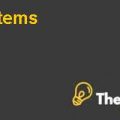TRANSFER PRICES
A transfer price is a price at which, different divisions of a company transact with each other. The transaction price may include the price to buy a product of a parent firm from its subsidiary or vice versa. That price can refer to any other service that a firm demands from another division.
The major issue highlighted in the data revealed by Bureau of Economic Analysis (BEA) is about transfer pricing between parent companies and their affiliations. The three renowned companies that were operating at higher transfer prices and generating higher revenue were charged withsome serious allegations. GlaxoSmithKline was charged with the allegation of avoiding tax payments and showing misappropriate profits in both the US and UK division. Internal Revenue Services (IRS) also claimed that Compaq U.S. paid higher prices for electronic components, which wasunreasonable and the purpose behind this was to shift all of its profits to Singapore. The last one is Seagate Technology Inc., it also has subsidiary in Singapore which has its operations relating to the supply of disk drives in the U.S, IRS contended that the U.S division overpaid for its supply of disk drives and further, they undercharged it for using their intangible assets that are supplied to it.
GLAXO SMITHKLINE
GSK is a merger between British rivals Glaxo Wellcome and SmithKline Beecham on December 1999. It is the second largest pharmaceutical company, which is famous because of its R&D and the products that they are offering. The company has a share of 7.3 percent in the global drug market. IRS claims that U.Ssubsidiary of GSK avoided paying taxes through the acts of profit transfers and claimed an amount of 2.7 Billion dollars for that period.
Glaxo in 1999 appealed for a formal relief under “U.S-UK convention for the avoidance of Double Taxation”.Glaxo observed that the company had already been taxed in Britain and if the U.Salso holds Glaxo accountable for the taxation, then the company would be reducing its profits by paying double taxes. Glaxo has also faced similar challenges from Canadian tax authorities claiming that Glaxo had paid three times the normal price, for sourcing ‘Ranitidine’.
Transfer Pricing Harvard Case Solution & Analysis
COMPAQ COMPUTER CORPORTAION
Compaq, the world largest computer manufacturer started manufacturing PCs in 1994. In 2000, the company’s sales were about $42 billion, the success of Compaq Computer Corporation was because of its high quality products and efficiency that its computers provide. The main issue with Compaq was about its tax deficiency and penalties that they bore. In 1991 and 1992, the Houston based company, IRS claimed that the organization failed to pay proper taxes and had underpaid its taxes in the US. The underpayment of these taxes relates to the U.S Compaq and its subsidiary in Singapore named Compaq Asia, for the purchases of PCAs during the period 1990-1993 and claimed a tax deficiency of 75 Million dollars.IRS claimed that the price transfer was too high as the manufacturing prices in Singapore are considerably low which were intended at shifting the earnings of the company to low-tax country.................
This is just a sample partical work. Please place the order on the website to get your own originally done case solution













